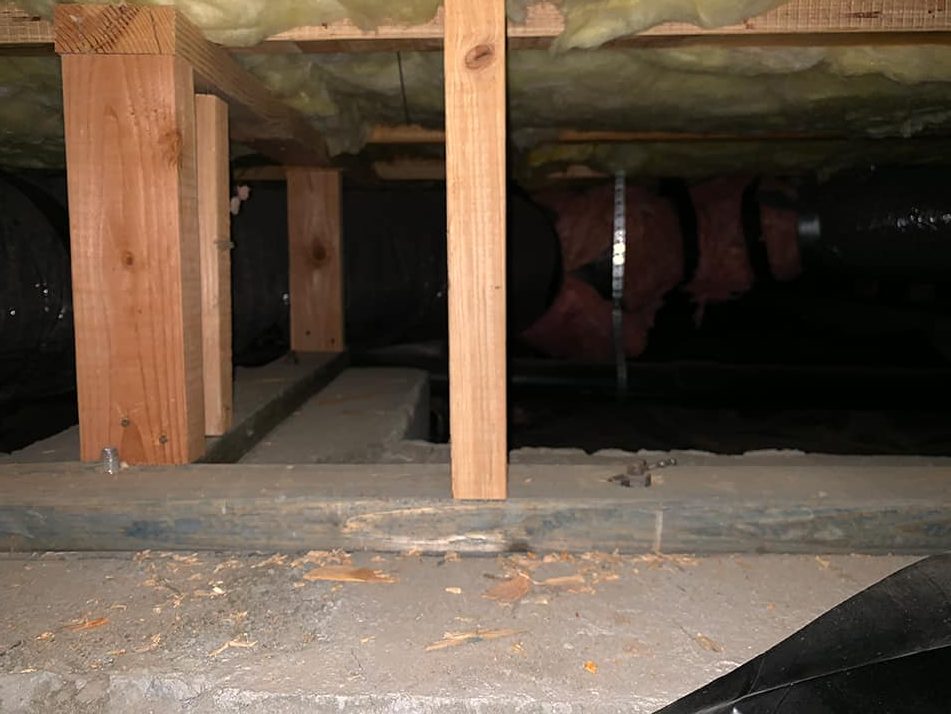
Is it a crawl space or is it a basement? Curious homeowners have pondered this conundrum ever since the day someone dug a hole under their house. I wanted to know what the difference was, so I did some research and here is what I found.
So, is a crawl space a basement? Basements are used as living space while a crawl space usually only provides room enough for light storage. For that reason, crawl spaces are not classified as basements.
Basements are more functional and also increase the value of a home significantly more than a crawl space. Crawl spaces, however, may be a good option for home owners in areas where basements aren’t an option.
What Is a Crawl Space Used For?
Crawl spaces are primarily used to provide quick access to mechanicals, plumbing, and foundation of a home. They also keep the house off of the damp soil, which keeps the floor of the home away from insects and moisture.
Basements Vs Crawl Spaces
In literal terms, a basement is an eight foot (or deeper) hole that ends in a concrete slab. A home with a crawl space basement (foundation), on the other hand, is elevated a few feet above a slab foundation supported by concrete blocks that bolster the walls of the structure.
Basements are used (when there finished at least) as a living space, and while crawl spaces are sometimes used for storage, their main purpose is to provide easy access to the electric and duct work of a home.
Crawl spaces are generally less than three feet tall and, by definition, have a dirt floor.
Now that you have a better idea of the definitions of both basements and crawl spaces, let’s talk about the pros and cons of each.
Basements
Pros
Basements are the set of many a childhood nightmare. The dust filled air, the musty stench and the gloomy lighting. Who didn’t dread being sent into grandma’s basement in search of strawberry jam bottled in the 60’s?
Yes, basements have a special place in the imagination of anyone who grew up around them. But besides filling your childhood with fear and excitement, what else are basements good for? And what are some of the drawbacks?
Although we are 100 year out from the last magnitude seven earthquake to occur on the San Andreas fault line, the myth continues to persist that basements are an unsafe foundation for homes.
Now, I’m not sure how basements were built in 1906, but today basements are the surest foundations for a home.
One of the greatest advantages that basements offer is security from earthquakes and other catastrophes Mother Nature is likely to dish out. Walls made of poured concrete anchor the structure to the ground making it resistant to storms, earthquakes, and powerful winds.
But maybe you live in the Midwest and the thought of an earthquake doesn’t scare you. “Earthquake?” you say. “I’ve never even heard of an earthquake round these parts.” Yeah, but if I even mention the word “tornado”, you are already running home and locking the door behind you. Don’t worry, basements provide excellent protection from tornadoes as well.
Possibly the greatest advantage of having a basement is cheap, per square footage cost as compared to other potential add-ons. An additional floor above your home, for example, is liable to cost ten times as much as a basement would.
On top of all that, basements make for an excellent living space year round. If you live in the Rocky Mountains (where your car engine will likely freeze in the winter and your tires will melt in the summer) like I do, the basement is the place to be.
Densely protected not only by insulation, but also thick mounds of dirt on all sides, basements aren’t phased by weather conditions outside. Warm in the winter, cool in the summer, and dark year-round. If you have never taken a nap in a basement on a roasting summer day, I highly recommend it.
Cons
Maybe a basement is looking pretty good to you right now. Maybe you are tired of being blown away by every lousy tornado that hits your neck of the woods. Maybe naps on your frigid concrete, slab-foundation aren’t very refreshing. Maybe you are feeling tempted to make the switch, but hold your horses! There’s a reason all children are terrified of basements.
Now don’t get me wrong, I think that in a fight between a basement and a crawl space, the basement will win only nine out of ten times. There are certain circumstances where basements are not good option.
In Florida, for example, it is illegal for most homes to have basements. Florida is like a large man floating in your town’s rec-center pool. It’s all kinds of moist in all kinds of places, and really gross. And just like that large man, if you try to dig an eight-foot-deep hole in the ground, it’s bound to get messy.
In other words, if you live close to the water table, your home is in danger of being flooded, and flooded basements can cause thousands of dollars in property damage. The threat of flooding can be alleviated however, if proper drainage is in place.
Some people are also irked by the lack of natural light in basements. Without windows, basements tend to be dreary places to be in, but that can be changed with some bright lights and cheerful decorating.
Now that we have covered basements, let’s move on to crawlspaces.
Crawl Spaces
Pros
The biggest advantage in the crawl space corner is the money saved in building a crawl space. Building a crawl space as opposed to a basement will usually save you between 5 to 10 thousand dollars, but could potentially save you upwards of 20 thousand dollars depending on the size of a home.
Crawl spaces also provide quick access to the basic utilities of a home (water, electric, etc.) which makes repairs easy.
Crawl spaces homes usually have warm floors. Being elevated from the ground, the floors are easily insulated and warm up fairly quickly when the temperature outside plummets.
Cons
Like I said before, crawl spaces are cheaper than basements, but that doesn’t mean that they take less time to build. Surprisingly, a crawl space foundation, and a basement take about the same amount of time to build.
Crawl spaces are also a hotbed for mold and other fungi. Even with the latest and greatest moisture protection, there is always that danger that mold will eat away at the foundation of your home. Not to mention leak into the rest of your home possibly causing severe respiratory issues.
Crawl spaces aren’t very safe either. If a storm comes a knockin’ or the earth starts a shakin’ your wallet is likely to be hurtin’. Storms cause thousands of dollars more in property damage to crawl space homes than they do to basement homes.
They also aren’t very useful for storage. That’s right, the moisture and mold that fill crawl spaces make them a poor choice to store anything other than concrete mix and bricks. If you store any sort of food or cloth down there, expect it to be rotten within the next three years.
Conclusion
What type of foundation you choose depends a lot on your budget and personal preferences. If you don’t care to have a basement, than a crawl space is the better option over a slab foundation.
If you do have enough cash in your budget to swing for a basement though, don’t hesitate to build one. Not only will it be excellent living space for you and your family, it will also greatly increase the value of your home. It may be an expensive investment to begin with, but trust me, it will be well worth it in the end.
Additional Questions
What is a slab foundation? Slab foundations are built directly on a concrete slab, hence the name. It is the cheapest way to build a foundation for a home and the quickest, but it also isn’t very secure and repairing a broken slab foundation can be a nightmare.
Where is illegal to build a basement? Zoning laws very not only state to state but sometimes city to city, so it is difficult to say exactly where you can and can’t build a basement. A good rule of thumb is if you are at least 100 miles from the coast than you are probably OK.
Is it safe to go into my crawlspace? Generally, it is safe to go into your crawl space. However, you will want to make sure you are prepared and know what you are getting yourself into. Crawl spaces can be home to pests such as raccoons, mice, and spiders. There can also be the potentially dangerous fungi that has grown in the crawl space, especially if it has been undisturbed for many years. It is best to consult with a professional before entering.
Do crawl spaces attract bugs? Yes, crawl spaces are notorious for attracting a variety of creepy crawlies. Spiders, centipede, cockroaches my seek refuge in your crawl space.
Should the crawl space be cleaned? You should clean your crawl space on an annual basis to ensure that there is no garbage, building debris, or decaying animal matter in the crawl space. This will reduce the amount of pests that inhabit your crawl space.

